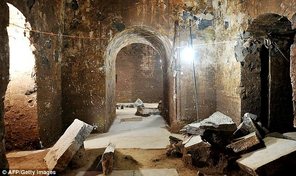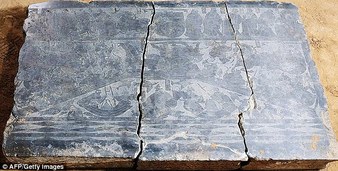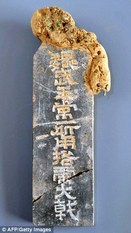
Burial found an estimated age of about 1,800 years old and believed to be the final resting place of Cao Cao, a general intelligent and a leader in the 3rd century often featured in folk tales as a cunning politician.
The complex was found in the village near the city Xigaoxue Anyang, Henan Province, and has an area of 8,000 square feet. In it there is 130 feet long tunnel leading to an underground chamber.According to historians, military and political intelligence Cao Cao has made it able to build the Wei state is regarded as the strongest and most prosperous state in China during the period of the three kingdoms (208-280 AD) during which China split into three different areas.
The complex was found in the village near the city Xigaoxue Anyang, Henan Province, and has an area of 8,000 square feet. In it there is 130 feet long tunnel leading to an underground chamber.According to historians, military and political intelligence Cao Cao has made it able to build the Wei state is regarded as the strongest and most prosperous state in China during the period of the three kingdoms (208-280 AD) during which China split into three different areas.
In the tomb were found the bodies of two women and a man, and more than 250 relics during the excavations that took place during the past year.
The body of the man was identified as a man aged 60s. While the two women's bodies were expected his 50s and 20s.
According to experts, the body of the man was Cao Cao, who died in 220 AD at the age of 65 years. Meanwhile, the bodies of two other women suspected of being the empress and servant.
In the cemetery were also found stone paintings featuring the social life of Cao Cao's society. Then also found a stone tablet that contains carvings on sacrificial objects and a few other items that are considered as private property Cao Cao.
The body of the man was identified as a man aged 60s. While the two women's bodies were expected his 50s and 20s.
According to experts, the body of the man was Cao Cao, who died in 220 AD at the age of 65 years. Meanwhile, the bodies of two other women suspected of being the empress and servant.
In the cemetery were also found stone paintings featuring the social life of Cao Cao's society. Then also found a stone tablet that contains carvings on sacrificial objects and a few other items that are considered as private property Cao Cao.

Earlier, a stone tablet inscribed "King Wu of Wei", the title given to Cao Cao after he died, was stolen from the tomb, but the authorities managed to get it back.
"Stone plates inscribed title is the strongest evidence we have that the tomb belonged to Cao Cao." Said Liu Qingzhu, archaeologists from the Chinese Academy of Social Sciences.
"We believe no one is likely to have a bearing on the relics of Cao Cao in a tomb that much, except, of course, the tomb belonged to Cao Cao himself."
Cao Cao who we know through the books and movies are the last leader of the Han dynasty east before eventually forming their own country during the period of the three kingdoms period of political turmoil.
He died in the year 220 AD in Luoyang, a city in eastern han dynasty and was awarded the title of emperor Wei state that he founded.
"Stone plates inscribed title is the strongest evidence we have that the tomb belonged to Cao Cao." Said Liu Qingzhu, archaeologists from the Chinese Academy of Social Sciences.
"We believe no one is likely to have a bearing on the relics of Cao Cao in a tomb that much, except, of course, the tomb belonged to Cao Cao himself."
Cao Cao who we know through the books and movies are the last leader of the Han dynasty east before eventually forming their own country during the period of the three kingdoms period of political turmoil.
He died in the year 220 AD in Luoyang, a city in eastern han dynasty and was awarded the title of emperor Wei state that he founded.

His father was the adopted son of the chief eunuch in the royal court and Cao was a commander of a small army before he was appointed as a general after a successful rebellion that threatened the Han empire.
The characters are showing Cao Cao is often portrayed as a cunning thugs in the famous novel "Romance of the Three Kingdoms". Crafty character is so famous in China that even be a saying that says "If you talk about Cao Cao, Cao Cao then will come". Aside from being a general, Cao Cao is also known as a poet.
Grave was discovered by accident in December 2008 when a worker near Kilin were digging mud for making bricks. The discovery was not reported to the government and local officials learned of the discovery that when the stone slabs bearing the title Cao Cao seized from a tomb raider.
The characters are showing Cao Cao is often portrayed as a cunning thugs in the famous novel "Romance of the Three Kingdoms". Crafty character is so famous in China that even be a saying that says "If you talk about Cao Cao, Cao Cao then will come". Aside from being a general, Cao Cao is also known as a poet.
Grave was discovered by accident in December 2008 when a worker near Kilin were digging mud for making bricks. The discovery was not reported to the government and local officials learned of the discovery that when the stone slabs bearing the title Cao Cao seized from a tomb raider.
 RSS Feed
RSS Feed